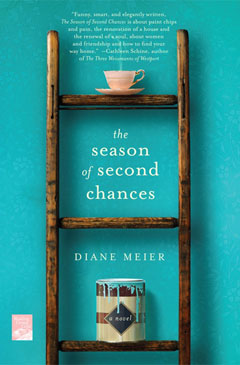
Joy Harkness moved to New York City to teach at Columbia years ago. The life she expected she'd have in New York - the one with a social life and excitement - never really materialized. At age 48, Joy is given an opportunity to teach at a small college in Massachusetts and participate in an exciting new project. Joy makes this huge life change, complete with an old Victorian fixer-upper. She feels a bit like a fish out of water in her new life. She is unused to dating, or even cultivating friendships yet as she is drawn out of herself, into new situations, she slowly finds her place.
Diane Meier'sThe Season of Second Chances: A Novel
is the sort of fiction I don't find myself reading a lot of. So many books that are geared towards women today and set in the present seem to have the same few story lines that often don't appeal to me. The Season of Second Chances felt different. A smart female protagonist that is an educator and teaches literature can only be a good thing. Diane Meier's career up until now has been one full of style and creating beautiful things. That is apparent in this book as she writes about the makeover of Joy's home and all the bits and pieces that go into it. She writes about personal style and the delicious food being cooked and eaten. I liked the cozy feeling of this book and experiencing Joy's house becoming a home.
I really enjoyed reading this book and was drawn into it right away. I found Joy to be a compelling character, though at times I wanted to yell at her! For such an intelligent woman she sometimes made really bad decisions, particularly about men. I thought about this and realized that was probably because she had kept inside of herself for so long. Dealing with adult emotions and motivations was something she needed practice with.
The Season of Second Chances is being released today. If you are interested in learning more about the author, Diane Meier, here is a link to her blog. It's interesting reading what she has written lately about her upcoming book release. I can only imagine how nerve-wracking that would be.
Now for the good news: Interpersonal Frequency LLC has kindly offered to send a signed copy of The Season of Second Chances to one lucky reader! Not only is this book a really a good read, it's also a gorgeous book. I saw a finished copy today and am in love with the endpapers. To enter the giveaway, please leave a comment on this post telling me what your favorite book of 2010 is so far, and make sure I have your email address. I will draw the winning name on April 7.
Many thanks to Interpersonal Frequency LLC for providing this review copy.










